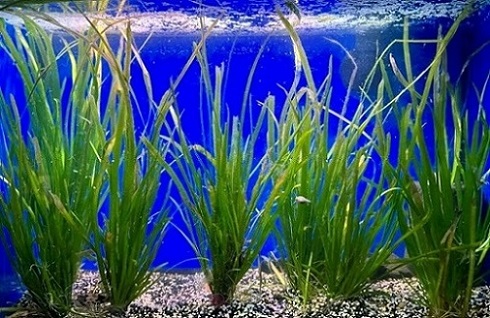Malaysian Study Finds That Vallisneria Spiralis Shows Promise for Breast Cancer Treatment
Nikhil Prasad Fact checked by:Thailand Medical News Team Feb 24, 2025 1 month, 3 weeks, 3 days, 14 hours, 44 minutes ago
Medical News: Malaysian Scientists Explore a Natural Alternative for Breast Cancer Therapy
Breast cancer remains one of the most significant health concerns worldwide, affecting millions of women annually. While conventional treatments such as surgery, chemotherapy, and radiation therapy are widely used, they often come with severe side effects. In search of safer and more effective treatments, researchers from Lincoln University College in Malaysia have turned to nature, investigating the potential of Vallisneria spiralis, an aquatic plant, as a natural remedy for breast cancer.
 Malaysian Study Finds That Vallisneria Spiralis Shows Promise for Breast Cancer Treatment
Malaysian Study Finds That Vallisneria Spiralis Shows Promise for Breast Cancer Treatment
This
Medical News report highlights a groundbreaking study that explores how extracts of Vallisneria spiralis, particularly in nanoparticle form, can help in combating breast cancer. The study involved both in vitro (laboratory-based) and in silico (computer-simulated) analyses to evaluate the plant’s effectiveness against MCF-7 breast cancer cells.
How Vallisneria Spiralis Was Studied
The research team synthesized silver nanoparticles (AgNPs) and iron oxide nanoparticles (IONPs) from Vallisneria spiralis extracts. These nanoparticles were then tested for their cytotoxic (cell-killing) effects on breast cancer cells. The antioxidant properties of the plant were also assessed using a DPPH radical scavenging assay, a common method to measure the ability of a substance to neutralize harmful free radicals in the body.
To further understand how the plant compounds interact with cancer cells, scientists conducted in silico molecular docking experiments. They used a specific target protein (PDB ID: 3CZH) associated with breast cancer progression to determine how well the plant’s bioactive compounds could bind to and inhibit the protein’s function.
Key Findings from the Study
1. Cytotoxic Effects on Breast Cancer Cells
The study found that as the concentration of Vallisneria spiralis-derived nanoparticles increased, the viability of breast cancer cells significantly decreased. Among the tested nanoparticles, silver nanoparticles (AgNPs) demonstrated the strongest anticancer activity, with an IC50 value of 18.26 µg/mL. This means that at this concentration, 50% of the cancer cells were eliminated. Iron oxide nanoparticles (IONPs) were also effective but required a higher concentration (IC50 = 42.22 µg/mL) to achieve similar results.
2. Antioxidant Properties
Vallisneria spiralis exhibited strong antioxidant potential, helping to neutralize free radicals that contribute to cancer progression. The DPPH assay showed that the plant extracts had significant free radical scavenging activity, suggesting their potential role in reducing oxidative stress, a key factor in cancer development.
3. Molecular Docking and Computational Analysis
The in-silico analysis demonstrated that p
hytochemicals extracted from Vallisneria spiralis effectively interacted with the breast cancer-associated protein (3CZH). Three key compounds from the plant exhibited strong binding affinity with this protein, forming stable hydrogen bonds and pi-alkyl interactions. These interactions indicate that Vallisneria spiralis compounds could interfere with cancer cell signaling pathways, potentially slowing tumor growth.
Implications of the Findings
The results of this study suggest that Vallisneria spiralis could serve as a promising natural alternative for breast cancer treatment. The plant’s nanoparticles not only displayed potent cytotoxic effects against cancer cells but also exhibited strong antioxidant capabilities, which are crucial in preventing oxidative damage in healthy cells.
Moreover, the molecular docking analysis confirmed that bioactive compounds from the plant effectively target key cancer-related proteins, supporting their potential use in precision medicine. These findings open the door for further studies, including clinical trials, to validate the safety and efficacy of Vallisneria spiralis-based treatments in humans.
Conclusions and Future Directions
The study highlights the immense potential of Vallisneria spiralis as a natural therapeutic agent against breast cancer. By harnessing the power of nanoparticles, researchers have demonstrated that this aquatic plant can significantly inhibit cancer cell growth while offering strong antioxidant protection. Unlike traditional chemotherapy, which often harms healthy cells, Vallisneria spiralis-based treatments could offer a more targeted and less toxic approach.
However, further research is needed to fully understand the mechanisms behind its anticancer effects and to determine its safety profile in human trials. If proven effective, Vallisneria spiralis-derived nanoparticles could revolutionize breast cancer treatment by providing a natural, cost-effective, and less harmful alternative to existing therapies.
The study findings were published on a preprint server and are currently being peer reviewed.
https://www.researchsquare.com/article/rs-5891558/v1
For the latest on Breast Cancer, keep on logging to Thailand
Medical News.
Read Also:
https://www.thailandmedical.news/news/new-hope-for-breast-cancer-patients-with-brain-metastases
https://www.thailandmedical.news/news/covid-19-s-effect-on-breast-cancer-cells
https://www.thailandmedical.news/news/breaking-covid-19-news-sars-cov-2-infections-lead-to-increased-risk-of-breast-cancer,-recurrence-of-breast-cancer-and-also-breast-cancer-metastasis
https://www.thailandmedical.news/news/study-shows-that-the-phytochemical-calycosin-extracted-from-red-clover-and-astragalus-propinquus-plants-can-help-prevent-breast-cancer-metastasis
https://www.thailandmedical.news/articles/cancer
https://www.thailandmedical.news/articles/herbs-and-phytochemicals
https://www.thailandmedical.news/pages/thailand_doctors_listings?category=49
Follow us on:
https://x.com/ThailandMedicaX
https://www.facebook.com/ThailandMedicalNews
https://bsky.app/profile/thailandmedical.bsky.social
https://gettr.com/user/thailandmedicalnews
https://www.tribel.com/thailandmedical/wall
and 33 other social media platforms
